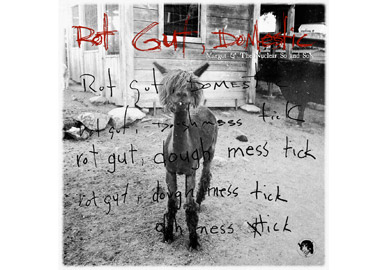Margot & The Nuclear So and So’s
Rot Gut, Domestic
(Mariel)
Combining a more British aesthetic for composition and production with a raw, undeniably American passion for gritty performance and storytelling, Margot & The Nuclear So and So’s have made a damn good album. Laying out a virtually seamless flow of rockers, ballads and indie noise-rock numbers, the Indiana natives, with the aid of producer John Congleton (Modest Mouse, Amanda Palmer), achieve arrangements, dynamics, tones and a general vibe that—no shit—puts them in a league with Radiohead. Hats off to primary songwriter Richard Edwards for delivering fabulous progressions, melodies and insightful lyrical perceptions of life and the world, but also to the tight, sensitive, perfectly complementary band around him. Every song on this disc is thoughtful, genuine, and built from just plain exceptional rock ‘n’ roll. —Tom Sturm
*
Sophia Knapp
Into the Waves
(Drag City)
According to press materials, Knapp’s first release away from her group Cliffie Swan (formerly Lights) was “written on planes, trains, while listening to rain, and drinking too much champagne.” After listening to nearly 37 minutes of breezy pop, it’s not hard to take that as truth. Where her previous work merged psychedelic experimentation and dance-ready jams (sometimes in the same song), Knapp’s solo disc is equal parts ’70s melodicism and soft rock. With husky vocals akin to those of Stevie Nicks, most tracks skip along with simple piano, synthesizer and guitar arrangements. Yet, for all their radio-friendly sheen, few numbers are especially noteworthy. The title-cut is the best bet. While it doesn’t bring one any closer to understanding Knapp’s “weird and wonderful world,” it does conjure an up-tempo rock vibe, an asset sorely missing from the rest of the proceedings. —Michael Cimaomo
*
Can
Tago Mago [40th Anniversary Edition]
Mute
As the rock canon continues to be revised, there’s increasing consensus that Can’s Tago Mago is one of the best albums of the ’70s. For newcomers, this edition of the German group’s most ambitious album makes an ideal intro. Their influential sound remains a startlingly fresh combination of The Velvet Underground, Miles Davis’ electric music, Stockhausen, and James Brown. Tago Mago showcases a dexterous mix of primal beats, sculpted feedback and drones, bright psychedelic textures, and infectious grooves—plus Damo Suzuki’s unique vocalizing, which adds propulsion to the songs without miring them in literal meaning. The album was expertly edited from numerous studio performances, so even the 18-minute “Halleluwah” doesn’t overstay its welcome. This edition also offers a previously unreleased concert from 1972. The music is compellingly woolly, but it partly demonstrates how the band’s radical studio edits helped vault them over their contemporaries. —Jeff Jackson



